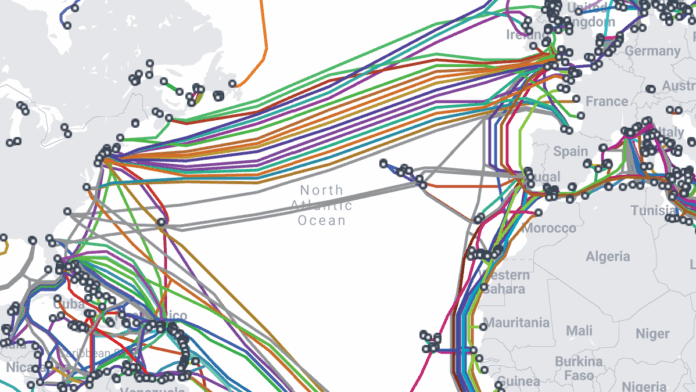A unanimous FCC agrees to update subsea cable regulations
The Federal Communications Commission is updating its rules on subsea communications cables, aiming to streamline regulations and add more protections to the increasingly important underwater infrastructure that connects the world.
All three current commissioners voted in favor of new proposed rules, and the FCC will take public input on further rule updates that are meant to help accelerate deployment of the expensive infrastructure — which can cost between $30,000 to $50,000 per kilometer to deploy.
The global subsea cable network is made up of about 450 cable systems spanning more than 1.5 million kilometers, according to the International Cable Protection Committee. Those cables are increasingly critical for global communications and are proliferating in part to meet the capacity and latency demands of AI infrastructure.
“Although we don’t see them resting on the ocean floor, submarine cables are the unsung heroes of global communications, carrying 99% of all Internet traffic and facilitating over $10 trillion in financial transactions every day,” said FCC Chairman Brendan Carr. “For the past decade, private companies have been investing an average of $2 billion annually in new construction of undersea cables. As the U.S. builds the data centers and other infrastructure necessary to lead the world in AI and next-gen technologies, these cables are more important than ever.”
Carr said that the proposed rules would “streamline the submarine cable licensing process, accelerate construction timelines, and provide certainty to investors.”
In an op-ed for RCR Wireless News, the CTO of Ciena’s international business wrote that increasingly, submarine cables will “need to land at places where they previously haven’t — away from populated areas and closer to power sources. … The issue is that it’s not easy to simply build a new submarine cable — these are projects that cost in the hundreds of millions of dollars and take years to plan and deploy.”
Carr also noted the importance of security for undersea cables. “In recent years, we have seen submarine cable infrastructure threatened by foreign adversaries, like China,” Carr said. “To mitigate those threats, this item proposes and seeks comment on various measures to protect submarine cable security against foreign adversary equipment and services. It also incentivizes the use of American submarine cable repair and maintenance ships and the use of trusted technology abroad.”
FCC Commissioner Anna Gomez said that the updated rules “do double duty by both increasing our security posture and streamlining processes to reduce burdens on submarine cable owners and to encourage critical future investments.”
Gomez added: “The hard work of this item really was in finding the balance between, on the one hand, necessary security measures to protect critical U.S. communications infrastructure against foreign adversary threats and, on the other hand, clarifying and streamlining processes to provide economic certainty that will facilitate investment and minimizing regulatory burdens by removing duplicative or unnecessary requirements where possible.”
“Subsea cables are uniquely vulnerable to espionage, sabotage, and surveillance. Our global adversaries understand this,” said FCC Commissioner Olivia Trusty. “Chinese state-owned and private companies continue to invest aggressively in subsea cable infrastructure, while the Russian military has demonstrated advanced capabilities to map and monitor undersea cable routes. These trends cannot be ignored, which is why today’s order is so important.”
United States laws dealing with subsea cables actually date back to 1800s, and the FCC has been regulating them since 1954. The agency has licensed 90 subsea cable systems. Cable landing licensees reported more than 5.3 million Gbps of available capacity in 2022 and 6.8 million Gbps of planned capacity for 2024, according to the Commission.
“With global competition for submarine cables increasing, connections to the U.S. should continue to be at the forefront of the submarine cable marketplace,” the FCC said in its release, adding that the new rules will support ” increasing amounts of capacity to meet current and future internet and data demands so that the U.S. remains the unrivaled world leader in critical and emerging technologies and secures AI dominance.”
The Report and Order that the FCC has issued includes rules that “apply a presumption of denial for certain foreign adversary-controlled license applicants, limiting capacity leasing agreements to such entities, prohibiting the use of ‘covered’ equipment, establishing cybersecurity and physical security requirements, and more,” the FCC said.
The agency has also put out a further NPRM asking for comment on additional rules to protect subsea cables and incentivise the use of American submarine cable repair and maintenance ships and “the use of trusted technology abroad” — while also proposing to exempt some subsea cable applications that “meet a high-level security standard” from “Team Telecom” review that looks at national security and law enforcement risks.

